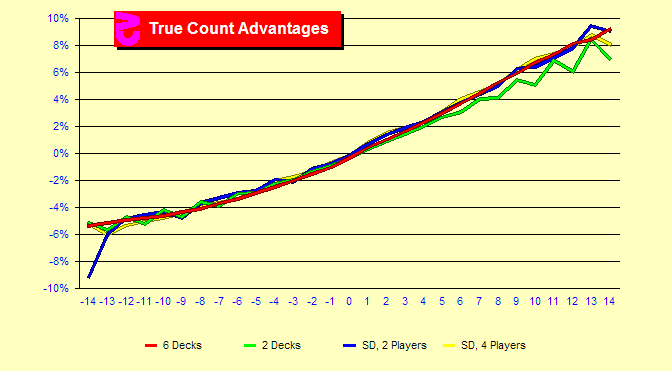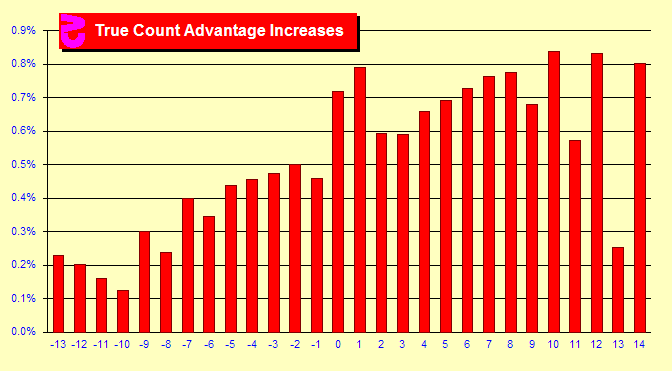|
|
Blackjack True Count Advantage
 How
valuable is each True Count? How
valuable is each True Count?
Here we will look at the advantage at each count. That is the percentage
gain you can expect on average from the initial Blackjack bet. Data
for six decks, two decks and single-deck with two or four players
are displayed. It can be seen that the number of decks does not
have a large effect on the curve. If the rules were not adjusted
by the casinos to provide about the same advantage for single-deck
and shoes, the curves would separate, but would still have about
the same shape. The upward trend appears fairly linear, but we will
see that it is not. The angle of the curve is greater in the positive
counts than in the negative counts. That is, the lines gently accelerate
upwards. The advantages here are positive at counts of +1 and above
and negative otherwise. But the +14 count is substantially more
positive than the -14 count is negative.
|
|
 What
is the change in advantage from TC to TC? What
is the change in advantage from TC to TC?
In this chart the increase in advantage at each count is displayed
for six decks. For example, the bar at +1 shows that the advantage
at a true count of +1 is .79% higher than the advantage at zero.
A common card counting rule of thumb is that the increase at each
count is about .5% for each count. As we can see this is a very
rough estimate. This is not surprising since the effect of indexes
kicks in at different points. Full indexes (over 100) were used
in this chart. With a smaller number of indexes, the gains in advantage
would be less. Few areas of Blackjack maintain simple linear relationships.
Insurance is the most notable exception.
|
|
Sim details
- Six decks, S17, DAS, LS, 4.81/6, Hi-Lo max indexes, trunc, half-deck
- Two decks, H17, DAS, 1.5/2, Hi-Lo Ill18 indexes, trunc, half-deck
- Single-deck, H17, 2 players, 4 rounds, Hi-Lo max indexes, trunc,
quarter-deck
- Single-deck, H17, 4 players, 2 rounds, Hi-Lo max indexes, trunc,
quarter-deck
- Ten billion rounds for six and two decks, five billion rounds
for single-deck
| |
|
|